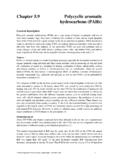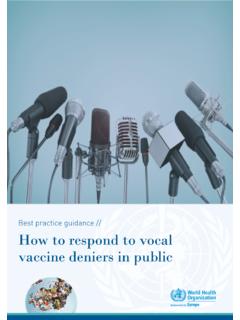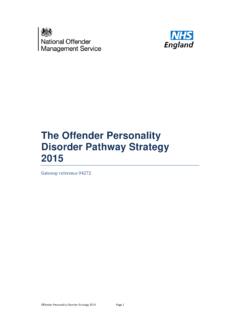Transcription of 11. Mental health in prison - World Health Organization
1 8711. Mental Health in prison Graham Durcan, Jan Cees ZwemstraKey points Prisoners with Mental Health problems benefit from good basic prison care. The Mental well-being of any prisoner can deteriorate if his or her needs are not met. Studies have consistently shown that the prevalence of poor Mental Health among prisoners is considerably higher than in the community. prison Mental Health services should be based on the Health needs of prisoners. This might require more intensive and integrated services than in the wider community. Prisoners with Mental Health problems will often also have several other vulnerabilities, such as substance misuse problems, poor physical Health , learning difficulties, poor life skills, histories of trauma, relationship difficulties, unstable housing and/or homelessness, poor education and limited experience of employment.
2 Mental Health treatment and care need to address all the prisoners needs, including their social needs, and be psychosocial in nature. The first step in understanding the Mental Health situation in a prison population is to ask prisoners their views on their needs and how these might be met. All staff working in prisons should have an appropriate level of Mental Health awareness training, which should cover the specific needs of those with personality disorders . Maintaining links between a prisoner and his/her family can be crucial for the Mental well-being of the prisoner, for a successful return to society on release, as well as benefiting the family. All prisoners should be screened on entry to prison for a range of Mental Health and related problems. There should also be other opportunities to identify needs.
3 Some prisoners suffer from severe or acute Mental Health symptoms and may benefit from treatment in a psychiatric unit, either in the prison or in a hospital. The Mental Health needs of different groups of prisoners such as women, older prisoners, children and young people, prisoners from minority ethnic or cultural groups and foreign prisoners, may need to be addressed differently. Continuity of care is important for a prisoner, including the continuation of treatment that he/she was receiving prior to incarceration and the handing over of care to a community-based provider on release. The notion of Mental Health recovery provides a useful approach for prison Mental Health care services. Mental Health recovery is not the same as clinical recovery. It is much more about social recovery and support for sufferers in overcoming social deficits and thereby improving their quality of life.
4 Fellow prisoners or ex-offenders can often help to support Mental well-being through mentoring. Where appropriate, preventing people with Mental Health problems from entering prison in the first place requires that Mental Health services liaise with police and courts and provide a diversion service. Comprehensive community care services should see those entering and leaving the criminal justice system as part of their chapter focuses on the basic principles that can guide those with a responsibility for providing prison Mental Health care. How these principles are translated into practice will vary according to national legislation and the local prison system and culture. Prisoners often come from communities where there is significant deprivation or poverty. Houchin s research in Scotland (1) found that in the most deprived communities one man in nine had been to prison at least once by the time they were 23 years of age.
5 These communities also have higher levels of ill Health , greater psychiatric morbidity and many social issues. It is important to recognize these factors, as supporting prisoners in maintaining their well-being or treating those with poor Mental Health is not only a matter of providing the right medication and psychological treatment, but is also about helping them to address their physical Health and social and prisoners rights and basic needsBlaauw & van Marle (2) have pointed out the importance of ensuring that all those incarcerated have their most basic needs and human rights met, such as access to light, food and water and access to exercise and meaningful Standard Minimum Rules for the Treatment of Prisoners include the following (3). There shall be no discrimination on the basis of race, colour, sex, language, religion, political or other opinion, sexual orientation, national or social origin, 88 Prisons and healthproperty, birth or other status and, on the other hand, it is necessary to respect the religious beliefs and moral precepts of the group to which a prisoner belongs (Rule 6).
6 Prisoners shall be kept in rooms that are sufficiently large and sufficiently lighted, heated and ventilated (Rule 10). Adequate bathing and shower installations shall be provided so that every prisoner may be enabled and required to have a bath or shower .. at least once a week (Rule 13). Prisoners shall be provided with water and with such toilet articles as are necessary for Health and cleanliness (Rule 15). In order that prisoners may maintain a good appearance compatible with their self-respect, facilities shall be provided for the proper care of the hair and beard, and men shall be enabled to shave regularly (Rule 16). Prisoners shall be provided with a separate bed, and with separate and sufficient bedding which shall be clean when issued, kept in good order and changed often enough to ensure its cleanliness (Rule 19).
7 Every prisoner who is not allowed to wear his own clothing shall be provided with an outfit of clothing suitable for the climate and adequate to keep him in good Health . Such clothing shall in no manner be degrading or humiliating (Rule 17). Every prisoner shall be provided at the usual hours with food of nutritional value adequate for Health and strength, of wholesome quality and well prepared and served, and drinking-water shall be available to every prisoner whenever he or she needs it (Rule 20).Additional factors essential to maintaining Mental Health are: reliable, tangible assistance from people, settings and services that facilitate self-advancement and self-improvement; recognition of the need to be loved, appreciated and cared for, and of the desire for intimate relationships that provide emotional sustenance and empathy; activity and distraction to maximize opportunities to be occupied and fill time; safety and environmental stability and predictability.
8 Privacy or systems that hold children and young people must take into consideration the United Nations Convention on the Rights of the Child (4), which underlines the importance of using custody as a last meet the Health needs of prisoners, prison Health care services should aspire to equivalence of care between standards inside and outside prison . This can be defined in different ways. Lines (5) warns that caution needs to be used, since equivalence of Health care can be defined as providing the same care as is provided outside the prison . Few systems achieve this, but Lines argues that this as a goal is not appropriate. prison populations do not reflect the communities that surround them; instead prisons represent communities where the prevalence of all illnesses, including and especially Mental illness, is much higher than in the community.
9 This might require more intensive and integrated services than in the wider community. Prevalence of poor Mental healthMost prevalence studies have been conducted in developed countries and show consistently that a very high proportion of prisoners suffer from poor Mental Health . For example, the most exhaustive study in the United Kingdom found that 90% of prisoners aged over 16 years suffered from a Mental illness, addiction or a personality disorder, and 70% of prisoners had two or more such problems (6). The prevalence of learning and communication difficulties and of addiction problems is also much higher than in the general population. In addition, prevalence studies in many countries show that 10 15% of the prison population suffer from severe and enduring Mental illnesses such as schizophrenia, bipolar disorder and autism disorders , often complicated by co-morbidity.
10 The prevalence rates of poor Mental Health for young people in prison are very high, including over half with conduct disorders (7) and around a third of young girls having a major depression. Studies in some countries have shown that the risk of suicide is much greater in a prison population, particularly in adolescent prisoners (8).Where studies of Mental illness have been conducted with prison populations, the prevalence has been consistently shown to be high. There is no reason to believe that countries which have not conducted such surveys will have significantly different prevalence and multiple needsPrisoners seldom have just one problem, and those suffering from Mental Health disorders may find that their Mental Health problems are exacerbated by their other problems or even caused by likelihood is that many prisoners will have interwoven multiple and complex problems.
















